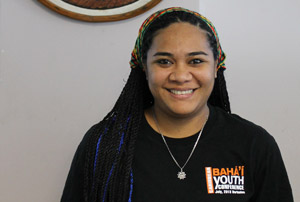“It’s important for youth to be involved at the high level” – Tahere Si’isi’ialafia, Samoa
Date:

Tahere Si’isi’ialafia’s is a 24-year-old Samoan youth delegate to the SIDS Conference. Photo: UN Women/Ellie van Baaren
At 24, Tahere Si’isi’ialafia’s Baha’i of Samoa is a board member of the Pacific Youth Council and has represented the UN Major Group for Children and Youth at several high-level international meetings, including the 58th Commission on the Status of Women. Passionate about sustainable development and gender equality, she provides a unique perspective, for she is studying for her Masters in Social Work at the University of West Indies in Jamaica, a SIDS country, and is taking part in the Third International SIDS Conference in her native Samoa. She speaks to UN Women about the importance of involving youth in such high-level fora.
Have gender equality concerns been meaningfully addressed in the Pacific? How can youth send these messages at the SIDS Conference?
We really need to know how to approach the issue of gender equality in the Pacific, especially in Samoa. Some people here say that women are already highly valued in the cultural system and within families so there is starting to be a little bit of backlash to the campaign for gender equality. Girls are getting education and employment opportunities in the Pacific, but they also face harassment within school and work environments, as well as other social issues like domestic violence. We need everyone on board. We should not fragment gender equality; we need to approach it holistically. That would help young people work together.
Youth like yourself are being more included in global discussions like this Conference, but are they more involved?
Youth representatives are often included in the preparatory stages of high-level conferences; however, when the outcome documents are released there is often little mention of youth concerns. That is the difference between being included and being involved. What are the signs they are really listening to us? The Pacific Youth Development Framework is one of the first instances where youth are fully engaged in the process; representing what they want in the Pacific. SPC [Secretariat of the Pacific Community] is taking the lead and the Pacific Youth Council is sitting with the development community, being treated as equal consultants in discussions.
Why is it important for youth to be involved in the SIDS Conference?
It’s important for youth to be involved at the high level because that’s where the power is. But what’s more important is that young people taking part at that level make linkages with other young people at the community level. You need to have links to the grass-roots to give advice to organizations wanting to know about issues for youth in the communities. It makes the relationship more productive and useful.
Standing up in front of all these high-level representatives is nerve-wracking but it’s easier once you know how important it is. I see myself as doing something good, so I try to be happy about it and enjoy it. This makes me do it again and again, which builds my confidence.
What is your message to Samoan youth about what they can do?
My message to youth is: do something in your community. Having a job and going to school are important but they are different from what you do in your community. You can do both. With such high rates of youth unemployment, a lot of young people are looking for job opportunities, but while waiting for those opportunities it is more productive to be involved in community service.
There is also great potential for national youth councils to run youth development programmes in partnership with the Ministry of Youth.
UN Women has co-sponsored Tahere at the Third International SIDS conference in Apia, Samoa